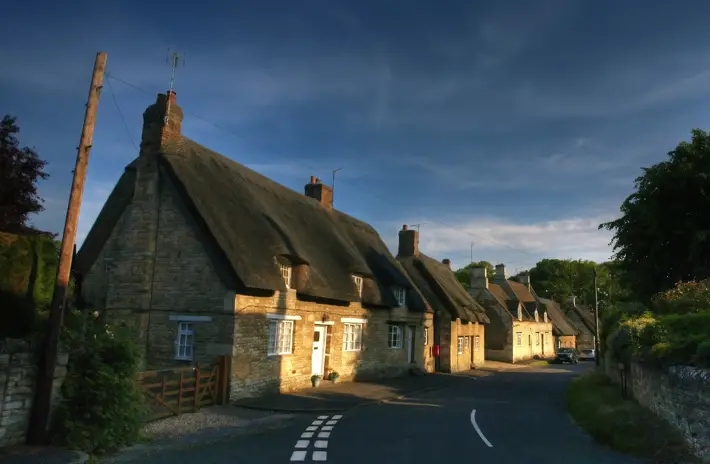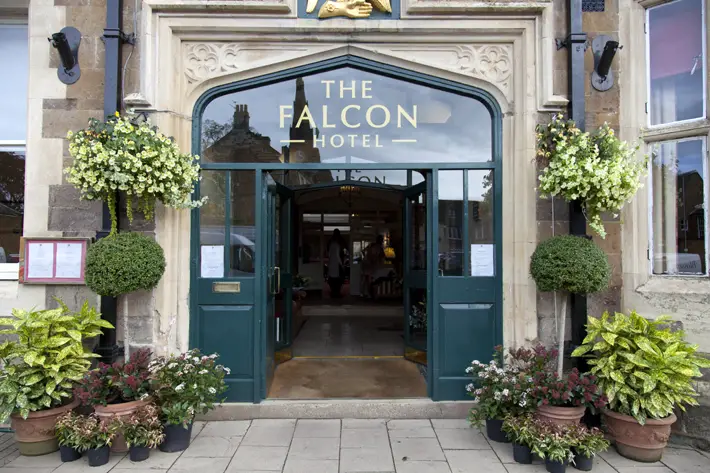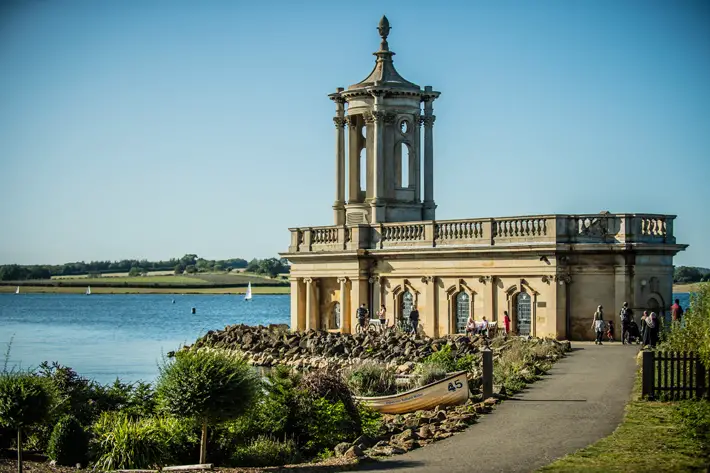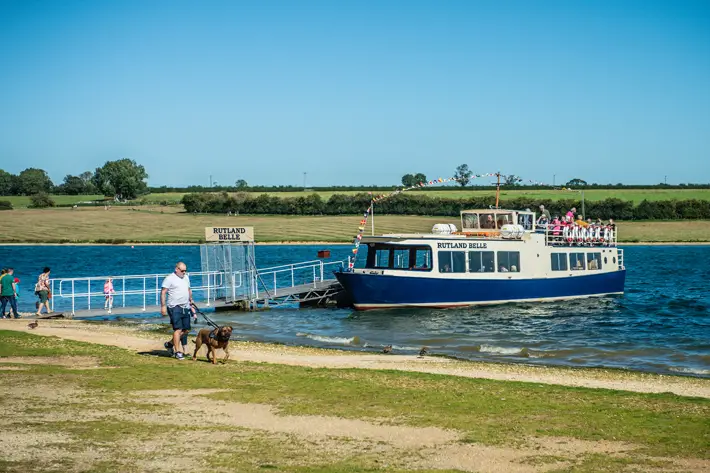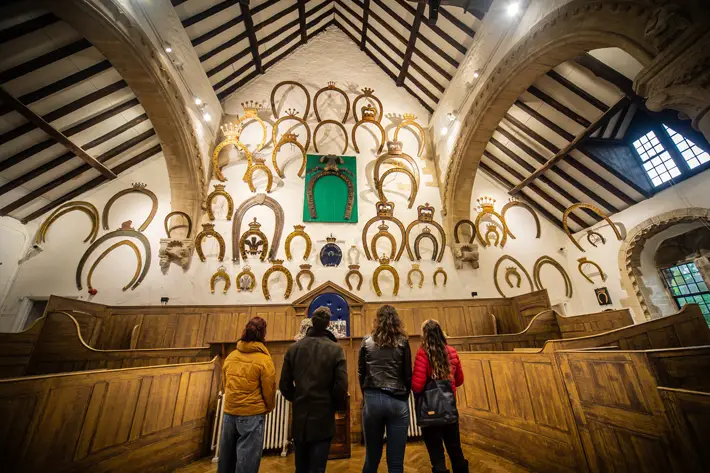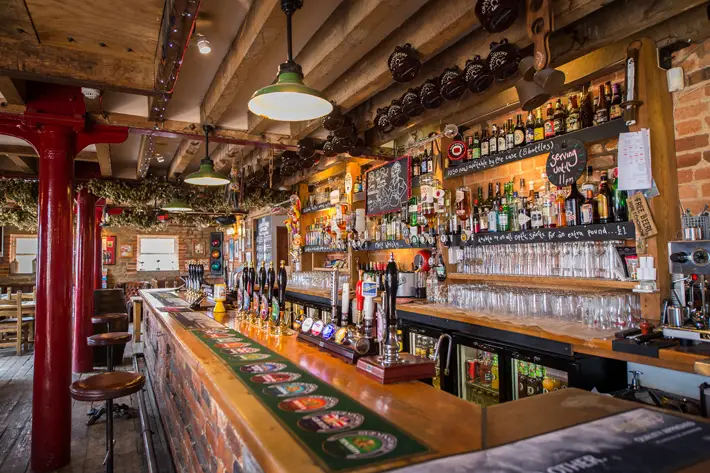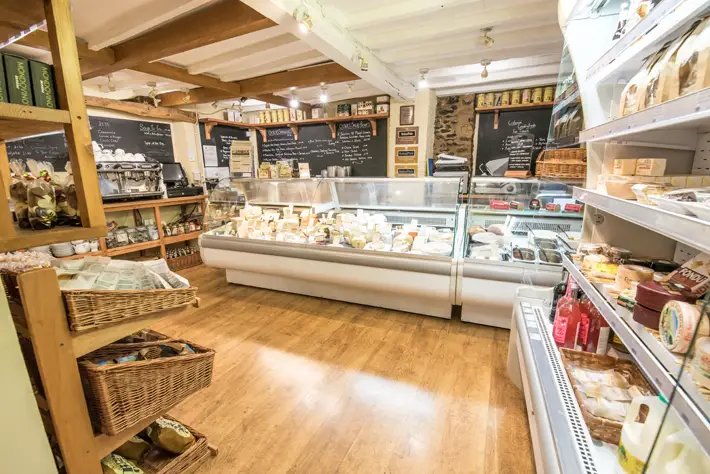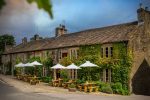Rutland – Travel Review
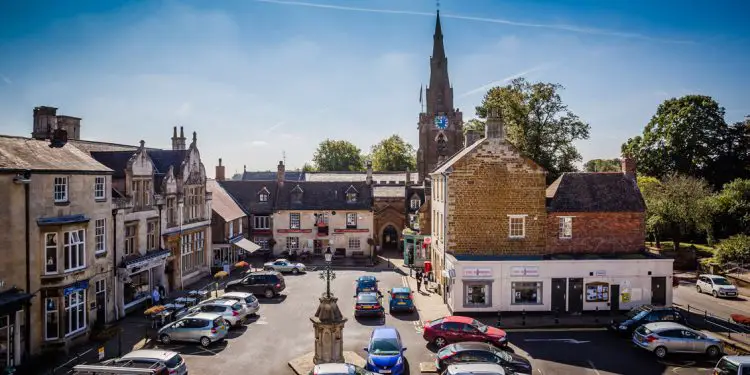
By Clare Jenkins
A few years ago, my husband and I were visiting the Rutland village of Braunston, when the hands on the 12th Century church clock started whizzing backwards. For a moment, it seemed as though we were literally going back in time, to Brigadoon maybe, or Shangri-La. In fact, the clock was simply being repaired, having stopped some weeks before.
The incident sums up something about Rutland. There’s always a sense of time suspended here, as though at any minute Mrs Miniver will cycle round the corner, or Miss Marple emerge from a honey-coloured cottage to tend her roses or feed the doves in the dovecote.
I was born in Rutland, my parents returned to the county after touring the Midlands with my father’s work, and my sister still lives in a tiny village there. So I know it pretty well, yet there are still plenty of people who don’t even know where it is – despite the fames of Rutland Water and the annual (now Global) Bird Fair. The smallest county in England – just 16 or so miles from top to bottom and side to side – is bordered by Northamptonshire, Lincolnshire and Leicestershire. For 20-odd years from the 1970s to the 90s, it was absorbed into Leicestershire, until campaigners managed to wrestle back control in 1997. They celebrated by issuing Rutland passports, though sadly I missed out on that one.
“The town falls quiet”
There are two market towns here – Oakham and Uppingham, both of which boast public schools founded (to educate poor boys, ironically) in the 17th Century by the Archdeacon of Leicester. Uppingham is essentially a large public school with a small town attached. And that’s where we’ve stayed the past couple of visits, at the equally ‘old school’ Falcon Hotel, a very comfortable, friendly 16th Century coaching inn with a 19th-century neo-Gothic front dominating the market square.
Because our bedroom faced the square, we could watch the town come to life first thing in the morning – cleaners arriving at the Vaults pub opposite, window-cleaners with their ladders, elderly men in maroon trousers and checked shirts (plus the occasional Panama hat) collecting their copies of The Times and Telegraph from the newsagents, schoolgirls with long straight hair and equally long skirts, boys weighed down with school rucksacks, crossing the square on their way to assembly.
Late at night, choristers in red vestments stride out from the half-hidden parish church, diners leave Don Paddy’s popular brasserie, drinkers down their final pints outside the Vaults, dogs at their side – until the square empties of people and cars and the town falls quiet again. On Friday mornings, you can watch the weekly market set up, with its bakers, fruit and veg stalls, cheesemakers, fishmongers and florists.
“Vision of the countryside”
Inside the Falcon, you might find elderly ladies in neat blouses and skirts playing bridge around a table in the dining-room or taking afternoon tea in the spacious lounge. In the pretty courtyard, wedding guests might be enjoying a glass or two of bubbly after the ceremony (which the hotel is licensed to hold) and before the reception in one of the oak-panelled rooms. Once a month, the Probus Club meets here for an excellent lunch and an expert talk on palaeontology, say, or astronomy, or on DNA or microbes. There’s even been one on maple syrup.
It’s that kind of place, Rutland. A place where you might expect to meet the cast of Middlemarch (the 1994 BBC adaptation was filmed in just-over-the-border Stamford). Its motto is Multum in Parvo – ‘much in little’ – and it’s a Ladybird vision of the countryside, with charmingly thatched cottages, gardens full of hollyhocks, honeysuckle and lavender, medieval fields, village greens, ancient churches.
People may no longer attend the churches in huge numbers, but most villages have one, and they can be fascinating to explore. According to Simon Jenkins, author of England’s Thousand Best Churches, “Rutland has more good churches per square mile than any other county.”
“Magnificent sculptures”
It’s not just their exteriors that appeal. As the Times’s former art critic Rachel Campbell-Johnston wrote of Britain’s churches last month: “The cathedrals, churches and chapels that scatter our country are spiritual refuges, not least because they are the repositories of some of our finest riches. Sculptures that stare blind-eyed and baffling from alien museum settings find a meaningful role in the places for which they were made.”
So it is in Rutland: churches with remnants of medieval wall paintings, gargoyles, magnificent sculptures to the great and the good, whether they died in Georgian times or Anglo-Saxon ones, plus more humble memorials and gravestones to ‘lesser’ mortals who lived and worked here, in times infinitely more feudal than today.
The most famous is probably Normanton Church, threatened back in the 1970s with being submerged under Rutland Water when the latter – England’s largest man-made lake, similar in size to Lake Windermere – was created. Built in the 1760s on a 14th Century foundation, the church evolved into a private chapel and mausoleum for the Heathcote Baronets before falling into disuse and disrepair. Rescued from demolition by a public outcry, it’s now another popular wedding venue. You can even travel there by the Rutland Belle, past sailing boats and windsurfers.
“Handsome”
As a reminder that the rich, like the poor, are always with us, the county also has its fair share of manor houses, and big houses converted into hotels (the award-winning Hambleton Hall, for one). Then there’s Oakham Castle, though only the Norman Great Hall remains, showing off 230 gold-painted horseshoes donated from Edward IV’s time by visiting earls, lords and marquesses. Oh, and The Queen and the Duchess of Cornwall.
Rutland boasts only one ‘stately home’, though, in the Palladian mansion of Burley on the Hill – not to be confused with Burghley House just over the border in Lincolnshire – and that’s converted into pricey apartments.
As for the schools… Oakham, whose old boys include cricketer Stuart Broad, comedian Miles Jupp and actors Matthew Macfadyen and Matt (Dr Who) Smith, is pretty discreet, its buildings clustering around All Saints parish church and the market square. Uppingham, on the other hand, is highly visible, if out of bounds to curious visitors, its handsome buildings – whether Elizabethan, Georgian, Victorian or 21st Century – extending every which way. After the First World War took the lives of 450 ex-pupils, the Memorial Hall and school cricket pavilion were built in their memory. More recent alumni include Stephen Fry, the actor Dominic Keating, McFly’s Harry Judd, the chef Rick Stein, classic FM presenter John Suchet and the BBC’s cricket correspondent Jonathan Agnew.
“Elegant bedrooms”
Unsurprisingly, then, Uppingham is an upmarket, refined kind of place, with its independent boutiques, antiques shops, Scandimania Coffee House, antiquarian Staniland Booksellers, Goldmark Gallery, quality charity shops and the family-run D Norton & Son ironmongers – the place to search for griddle pans, candle-snuffers, chamois leathers and sweet pea seeds. That sense of refinement is very much shared by The Falcon, too, whose staff are helpful, attentive and extremely accommodating. The food is traditional, the breakfasts excellent, and the smart, elegant bedrooms offer White Company toiletries and handmade shortbread biscuits, along with furniture and furnishings from those same antiques shops and from Sarah Harding Interiors, just along the street.
If you want to be nearer Oakham, however – though nowhere is far from anywhere in Rutland – and want on-site leisure facilities, try Rutland Hall Hotel, tucked away in 65 acres of parkland with views over Rutland Water. Built in 1890 as the hunting lodge of the 6th Earl Fitzwilliam, the former Barnsdale Hall Hotel has been gradually extended to include apartments and Scandi-style wooden timeshare lodges. Over the past couple of years, under new owners, it’s been extensively – and expensively – refurbished, transforming the 66 bedrooms, reception and function rooms, and creating a luxurious new Blossoms restaurant and lounge, complete with grand piano.
“Iconic signalbox”
Although the spa has yet to open – that’s planned for next year – spa treatments are available, together with a swimming pool, gym, crazy golf and tennis courts and a bowling green.
Oakham itself is strong on independent shops, as well as The Grainstore Brewery (regarded by those who know as one of the best real ale pubs in Britain) and Otters Fine Foods, a classy café-cum-delicatessen, where you can buy all sorts of upmarket goodies, including local Rutland Red, Colston Bassett and Lincolnshire cheeses. There’s the county museum, ancient stocks and a butter cross in the market square, and the railway station boasts an iconic signalbox, well-known to any schoolboy who’s ever had an Airfix kit.
As well as Oakham’s twice-weekly markets, it would seem that every other village has a box of free-range eggs outside one house or other. You might also stumble across the odd farm cart or church selling homemade preserves, chutneys and cakes (with an honesty box for the money), plus the occasional (though nothing like enough) pop-up village hall tea and coffee morning as you drive, cycle or walk around the county.
Where walking is concerned, Oakham is the finishing point for the 147-mile Viking Way from the Humber Bridge. Strolling around or striding out anywhere in Rutland, you may see hares lolloping across fields, startled pheasants flying out of hawthorn hedges, red kites and ospreys gliding above you.
“Timeless”
But it’s also fun just to tootle around the countryside by car, or by the Rutland Flyer bus, either from Oakham to Corby or in the opposite direction to Melton Mowbray. The little bus weaves around country lanes and through a landscape of buttercup meadows, barley fields, farmland, copses, spinneys, sheep and church spires. Among the villages it visits is Lyddington, with its English Heritage-owned Bede House, a former medieval bishop’s palace and almshouse with bedrooms for 12 men (and two women) who were “free of lunacy, leprosy or the French pox”. If you ask nicely, in season you may even be allowed to help yourself to wild rhubarb from its garden.
The Flyer also passes through Wymondham, with its still functioning windmill standing among a little cluster of independent shops and a café. And it tootles past the delightful village of Teigh, whose rectory was used by the BBC for its hugely popular 1995 adaptation of Pride and Prejudice.
Yes, there is much that is timeless about Rutland. Though not, nowadays, that Braunston church clock.
Further information: discover-rutland.co.uk
images: Rjphotographics, courtesy of Discover Rutland
